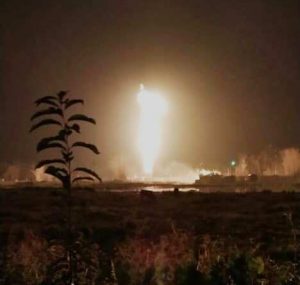A government-owned oil exploration firm had reportedly been operating a natural gas well in India’s border state of Assam without the mandatory permissions.
A panel set up by the National Green Tribunal (NGT) has observed that Oil India Limited (OIL) did not carry out a biodiversity impact assessment study for the Baghjan well despite orders from the Supreme Court.
The well is near the Dibru Saikhowa National Park which is home to 36 mammal and 382 bird species including a host of endangered animals. Legal action has been recommended by the panel against the firm and its officials.
The Baghjan well has been in the eye of a storm following a blowout in May resulting in the uncontrolled escape of oil and gas. It caught fire on June 9 resulting in the loss of three lives besides compelling many families to relocate to safer zones. Residents near the well staged protests seeking early release of compensation and capping of the well so that they can return to their homes.
Several laws mandate that oil exploration firms obtain consent before executing operations, including the Air (Prevention and Control of Pollution) Act, Water (Prevention and Control of Pollution) Act, and Hazardous Waste (Management & Handling) Rules, and Hazardous and Other Wastes (Management & Transboundary Movement) Rules.
An inquiry by the panel revealed that OIL had not obtained the mandatory clearances for its operations. In addition, it was found that the ambient noise levels in the region adjacent to the well after the blowout were above the permissible limit.
OIL has been ordered to reduce the noise level, ensure treatment of people in the vicinity of the well and make financial compensation to the affected families. The final report will be submitted by the panel to the NGT next month.
OIL spokesperson Tridiv Hazarika was quoted by the media as saying that a statement would be issued after the submission of the final report. A release from the firm also said that 369 million Indian rupees has already been released to the families affected by the inferno.
Assam lies in India’s frontier northeast which consists of eight states. It is a biodiversity hub and a crisis prone region that is seismically active and susceptible to flood and erosion.
The panel’s findings are a stark reflection of the manner in which government-owned firms operate in eco-sensitive zones of India. Not long ago, another government-owned enterprise, North Eastern Coalfields Limited, was embroiled in a controversy for exploring for coal in Assam near a national park rich in biodiversity. The firm has decided to halt all operations following the uproar which also prompted some citizens to seek legal redress.
Meanwhile, the fire at the Baghjan oil well continues to rage despite attempts by OIL to douse it. After efforts were made to control the blaze, the Singapore-based Alert Disaster Control was engaged to plug the blowout.
The team only manage to replace the blow out preventer (BOP) on the well head and divert the gas to a “flare pit” but the fire could not be doused. Subsequently, OIL brought a team from Alberta, Canada, to douse the fire by a technique called “snubbing.” On November 6, experts had begun the exercise to assemble the Blowout Preventer and the snubbing unit at the well plinth in Baghjan.
Rajeev Bhattacharyya is a senior journalist in Assam, India

































